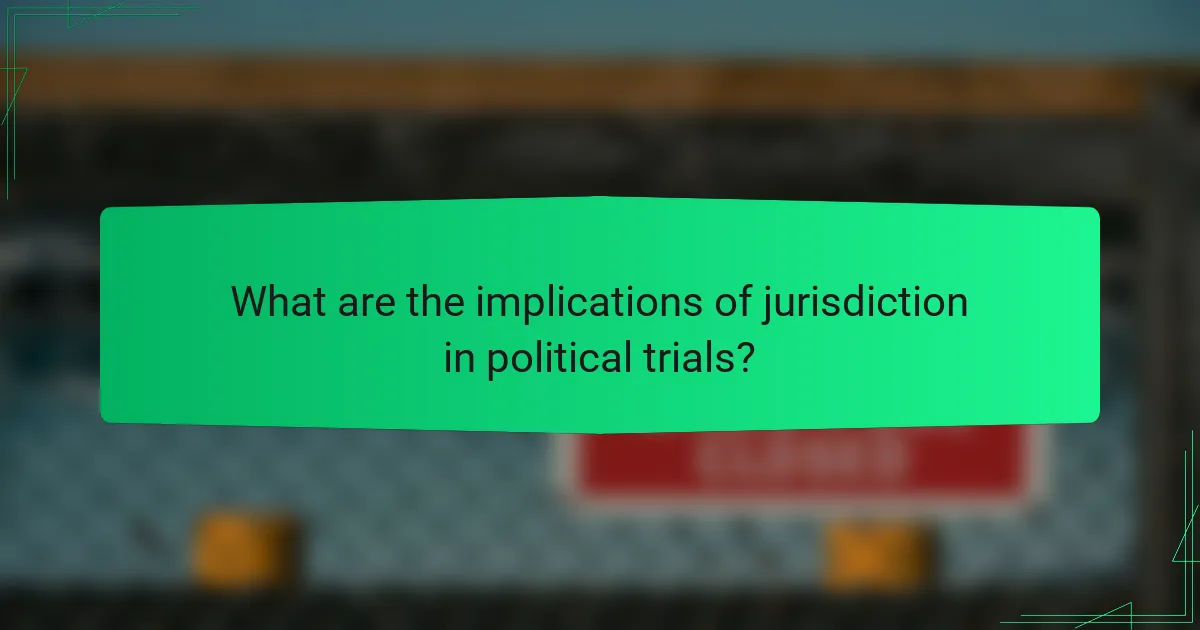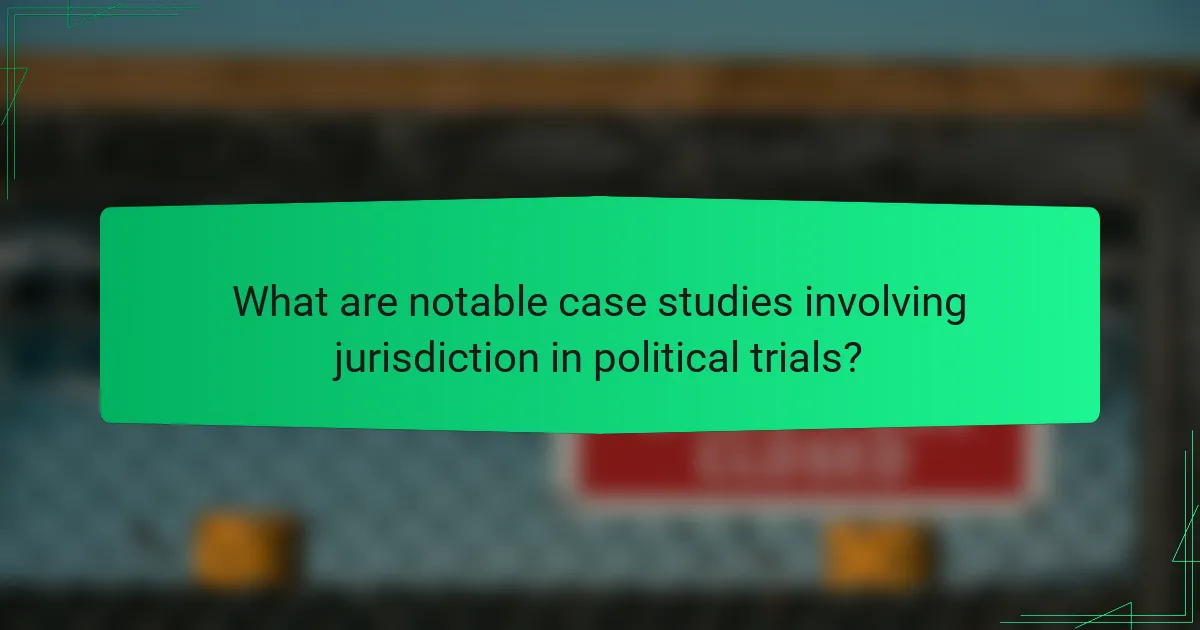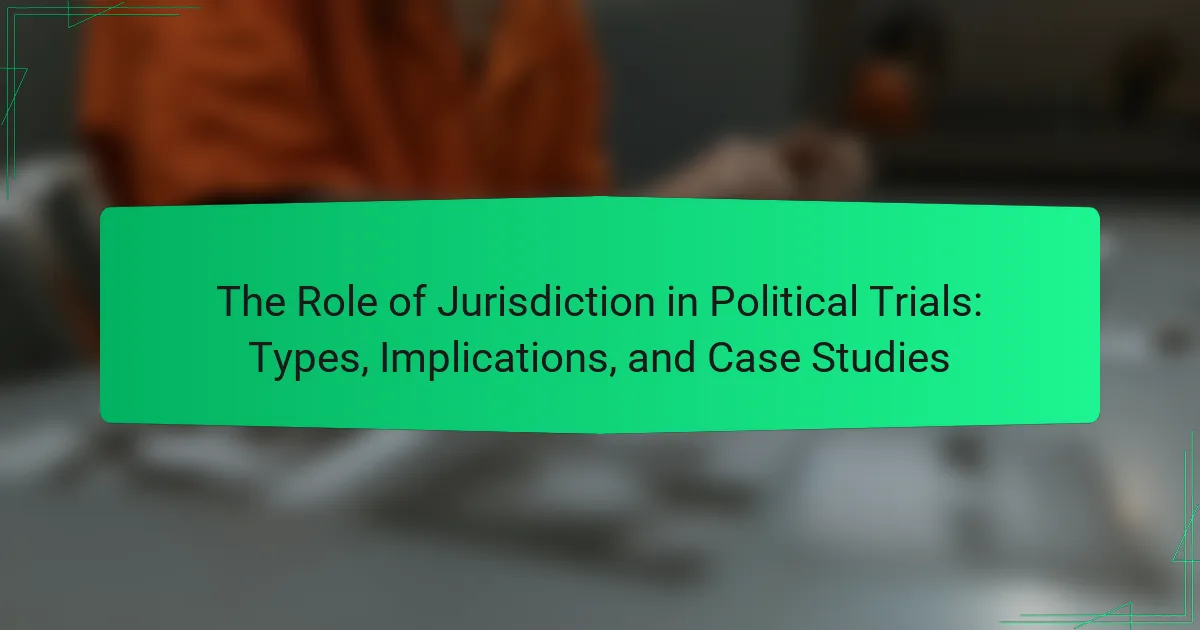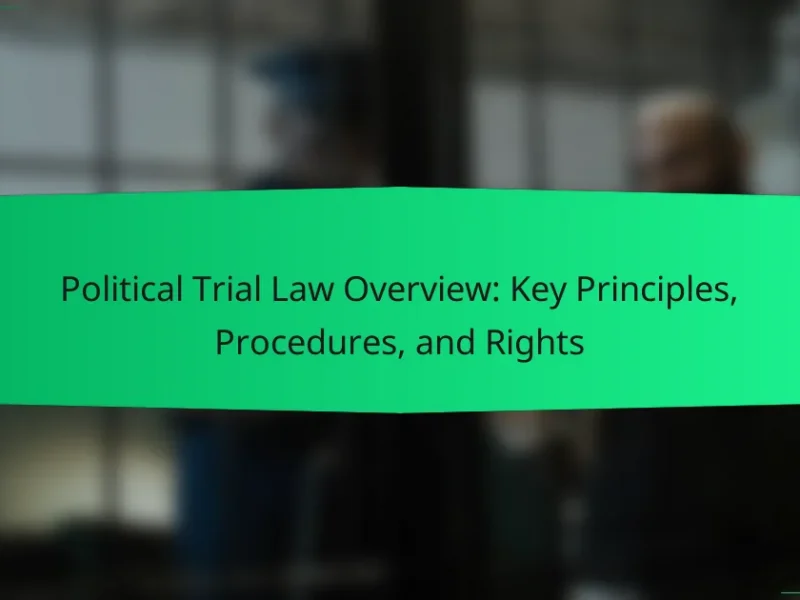Jurisdiction is the legal authority of a court to hear and decide cases, particularly in political trials where issues of national security and governmental authority are involved. This article examines the various types of jurisdiction, including geographical location, subject matter, and the parties involved, and discusses their implications on trial fairness and outcomes. It highlights notable case studies such as the Nuremberg Trials and the International Criminal Court (ICC) cases, illustrating how jurisdiction shapes international law and impacts defendants’ rights. The complexities of jurisdictional challenges and their effects on legal proceedings are also explored, emphasizing the importance of jurisdiction in achieving justice and accountability in politically sensitive contexts.

What is the Role of Jurisdiction in Political Trials?
Jurisdiction determines the authority of a court to hear and decide political trials. It defines the legal boundaries within which a court operates. Jurisdiction can be based on geographical location, subject matter, or the parties involved. In political trials, jurisdiction often influences the fairness and outcome of the case. Political trials may involve issues of national security or governmental authority. Different jurisdictions may interpret laws and rights differently. This can lead to variations in trial procedures and outcomes. Historical examples show how jurisdiction has affected political trials in various countries. For instance, the Nuremberg Trials established international jurisdiction for war crimes.
How does jurisdiction influence the outcomes of political trials?
Jurisdiction significantly influences the outcomes of political trials by determining the legal framework and authority governing the proceedings. Different jurisdictions have varying laws, procedures, and standards of evidence, which can affect trial outcomes. For instance, in some jurisdictions, political defendants may benefit from more lenient standards of proof. Conversely, in other jurisdictions, they may face harsher penalties or less favorable legal interpretations.
Furthermore, jurisdiction can impact the impartiality of the trial. Trials held in jurisdictions with political biases may lead to unfair outcomes. Historical examples include political trials in authoritarian regimes, where the judiciary often lacks independence. A study by the International Journal of Constitutional Law highlights that jurisdiction shapes judicial discretion and can lead to politically motivated verdicts. Thus, the choice of jurisdiction plays a crucial role in the fairness and integrity of political trials.
What are the key attributes of jurisdiction in the context of political trials?
The key attributes of jurisdiction in the context of political trials include territorial jurisdiction, subject matter jurisdiction, and personal jurisdiction. Territorial jurisdiction refers to the geographic area where a court has authority. It determines which court can hear a case based on where the events occurred. Subject matter jurisdiction pertains to the court’s authority to hear specific types of cases, such as political trials. Personal jurisdiction involves the court’s power over the individuals involved in the trial, based on their connections to the jurisdiction. These attributes ensure that political trials are conducted within the appropriate legal framework. Historical examples, such as the Nuremberg Trials, illustrate how these jurisdictional attributes were applied to address crimes against humanity.
How do different jurisdictions interpret political trials?
Different jurisdictions interpret political trials based on their legal frameworks and historical contexts. In some countries, political trials are viewed as necessary for national security. For example, in the United States, political trials often involve allegations of corruption or abuse of power. In contrast, jurisdictions like Russia may interpret political trials as tools for suppressing dissent. Historical cases, such as the trial of former Ukrainian Prime Minister Yulia Tymoshenko, illustrate how political motivations can influence judicial outcomes. Furthermore, international law may dictate standards for fair trials, impacting interpretations in various jurisdictions. Overall, the interpretation of political trials varies significantly, reflecting local legal traditions and political environments.
What types of jurisdiction exist in political trials?
There are several types of jurisdiction that exist in political trials. These include subject matter jurisdiction, which refers to the authority of a court to hear cases of a particular type. Territorial jurisdiction is another type, determining the geographical area within which a court has authority. Personal jurisdiction focuses on the court’s power over the individuals involved in the trial.
Additionally, appellate jurisdiction allows higher courts to review decisions made by lower courts. There is also concurrent jurisdiction, where multiple courts have the authority to hear the same case. Each type of jurisdiction plays a significant role in determining how political trials are conducted and where they can take place.
What are the differences between territorial and extraterritorial jurisdiction?
Territorial jurisdiction refers to the authority of a state to govern within its own borders. This type of jurisdiction is based on the location where a crime occurs or where a legal matter arises. Extraterritorial jurisdiction, on the other hand, allows a state to exercise legal authority beyond its borders. This may occur when a state seeks to enforce its laws on actions that have effects within its territory, even if those actions took place elsewhere.
The primary difference lies in the geographical scope of authority. Territorial jurisdiction is limited to the physical boundaries of a state. In contrast, extraterritorial jurisdiction extends to actions that may impact the state, regardless of where they occur. For example, many countries assert extraterritorial jurisdiction over crimes like human trafficking or terrorism that affect their national interests.
This distinction is significant in international law and can lead to conflicts between nations. Understanding these differences is crucial for legal practitioners and policymakers.
How does universal jurisdiction apply to political trials?
Universal jurisdiction allows states to prosecute individuals for serious crimes, regardless of where the crime occurred. This principle applies to political trials involving crimes such as genocide, war crimes, and crimes against humanity. Political trials under universal jurisdiction can occur even if the accused is not a national of the prosecuting state. Countries like Spain and Belgium have utilized universal jurisdiction to pursue political leaders accused of human rights violations abroad. The application of universal jurisdiction serves as a mechanism to hold perpetrators accountable and deter future violations. Courts may invoke this jurisdiction when local legal systems fail to act against such crimes. This legal framework emphasizes the international community’s responsibility to address egregious offenses.

What are the implications of jurisdiction in political trials?
Jurisdiction in political trials determines the legal authority to adjudicate cases. This authority can influence the outcome and fairness of trials. Different jurisdictions may have varying laws and standards for evidence. Political trials often involve sensitive issues, impacting public perception and legitimacy. Jurisdiction can also affect the rights of defendants, including access to legal representation. For example, an international tribunal may impose different rules than a domestic court. Additionally, jurisdictional challenges can lead to delays and complications in legal proceedings. These implications highlight the importance of jurisdiction in ensuring justice and accountability in political trials.
How does jurisdiction affect the fairness of political trials?
Jurisdiction significantly impacts the fairness of political trials. It determines which court has the authority to hear a case. Different jurisdictions may have varying laws, procedures, and standards of evidence. This can lead to discrepancies in how justice is administered. For instance, a trial in an authoritarian regime may lack impartiality compared to one in a democratic system. Historical examples show that political trials often reflect the biases of the jurisdiction. In some cases, political motivations can influence judicial outcomes. Therefore, the jurisdiction can either enhance or undermine the perceived legitimacy of a political trial.
What role does jurisdiction play in the protection of human rights during trials?
Jurisdiction plays a critical role in the protection of human rights during trials. It determines the legal authority to adjudicate cases, impacting the fairness and legality of proceedings. Jurisdiction can influence the application of international human rights standards. For instance, jurisdictions that adhere to international treaties often provide stronger protections for defendants. The Universal Declaration of Human Rights emphasizes the right to a fair trial, which is enforced differently depending on jurisdiction. Additionally, the European Court of Human Rights has ruled on cases where jurisdictional issues affected human rights protections. Thus, the scope and nature of jurisdiction directly affect the safeguarding of human rights in legal contexts.
How can jurisdictional disputes impact trial proceedings?
Jurisdictional disputes can significantly impact trial proceedings by causing delays and complications. These disputes arise when there is uncertainty about which court has the authority to hear a case. As a result, parties may engage in lengthy legal battles to determine the appropriate jurisdiction. This can lead to postponements in the trial schedule, affecting the timely resolution of cases.
Additionally, jurisdictional issues can result in increased legal costs for the parties involved. When multiple jurisdictions claim authority, litigants may need to hire legal experts in various laws. This complexity can confuse jurors and judges, potentially influencing trial outcomes.
Historical examples illustrate these impacts; cases involving federal versus state jurisdiction often face significant procedural hurdles. These hurdles can ultimately alter the course of justice and the effectiveness of legal proceedings.
Why is jurisdiction important for international law in political trials?
Jurisdiction is crucial for international law in political trials because it determines the legal authority to adjudicate cases. Without clear jurisdiction, accountability for political crimes may become ambiguous. Jurisdiction establishes which court can hear a case and enforce legal standards. It helps prevent impunity by ensuring that perpetrators of political offenses face justice. Different jurisdictions can have varying laws and definitions of political crimes. This can lead to conflicts when multiple nations claim authority. Historical examples show that lack of jurisdiction can hinder justice, such as in the Rwandan Genocide cases. Thus, jurisdiction is essential for maintaining legal order and upholding international norms in political trials.
What challenges arise from conflicting jurisdictions in political trials?
Conflicting jurisdictions in political trials create significant challenges. These challenges include legal inconsistencies that arise when different jurisdictions apply varied laws to the same case. This can lead to confusion regarding which laws are applicable and how they should be enforced. Additionally, conflicting jurisdictions may cause delays in the legal process, as parties navigate multiple legal systems.
This complexity can undermine the legitimacy of the trial, as defendants may argue that they are being subjected to unfair treatment. Furthermore, conflicting jurisdictions can result in different outcomes for similar cases, leading to perceptions of bias or injustice. Historical examples, such as the trials of political leaders in international courts versus national courts, illustrate these challenges. Such cases often highlight the difficulties in achieving a unified legal approach across jurisdictions.
How do international treaties address jurisdiction in political trials?
International treaties address jurisdiction in political trials by establishing legal frameworks that dictate how cases are handled across borders. These treaties often delineate the responsibilities of states in prosecuting political crimes. They provide guidelines on which jurisdiction has the authority to try individuals based on the location of the crime or the nationality of the accused. For instance, the Geneva Conventions outline obligations for states to prosecute war crimes, which can include political trials. Additionally, treaties like the Rome Statute of the International Criminal Court set up a system for international accountability, allowing for jurisdiction over serious offenses regardless of where they occur. Such frameworks ensure that political trials are conducted fairly and consistently, promoting justice on an international scale.

What are notable case studies involving jurisdiction in political trials?
Notable case studies involving jurisdiction in political trials include the Nuremberg Trials and the International Criminal Court (ICC) cases. The Nuremberg Trials prosecuted Nazi war criminals after World War II. They established principles of international law regarding jurisdiction over crimes against humanity. The trials involved multiple countries, emphasizing the concept of universal jurisdiction.
The ICC, established in 2002, addresses war crimes, genocide, and crimes against humanity. It has jurisdiction over individuals rather than states. Notable cases include those against Sudanese President Omar al-Bashir for genocide in Darfur. This case highlighted challenges in enforcing jurisdiction across borders.
Another significant case is the trial of former Yugoslav leader Slobodan Milošević at the International Criminal Tribunal for the former Yugoslavia (ICTY). This trial examined war crimes during the Balkan conflicts. It underscored the complexities of jurisdiction in politically sensitive contexts.
These case studies illustrate the evolving nature of jurisdiction in political trials and its implications for international law.
What key political trials have highlighted jurisdictional issues?
Key political trials that have highlighted jurisdictional issues include the Nuremberg Trials and the trial of former Chilean dictator Augusto Pinochet. The Nuremberg Trials established international jurisdiction over war crimes, challenging national sovereignty. Pinochet’s case raised questions about extradition and universal jurisdiction for human rights violations. The International Criminal Court’s trials also emphasize jurisdictional debates in prosecuting crimes against humanity. These cases illustrate the complexities of jurisdiction in addressing political accountability on a global scale.
How did the case of [specific trial] illustrate the complexities of jurisdiction?
It is not possible to answer the question as it lacks a specific trial reference. Without a defined case, I cannot illustrate the complexities of jurisdiction.
What lessons can be learned from the outcomes of [another specific trial]?
It is not possible to provide an answer without knowing the specific trial referenced in the question. Each trial yields unique lessons based on its context, outcomes, and implications.
What best practices can be derived from case studies on jurisdiction in political trials?
Best practices derived from case studies on jurisdiction in political trials include establishing clear legal frameworks. These frameworks ensure consistent application of laws across different jurisdictions. Transparency in judicial processes enhances public trust and accountability. Engaging stakeholders in the legal process fosters inclusivity and mitigates bias. Utilizing international legal standards can provide guidance and legitimacy. Regular training for judges and legal practitioners on political trial nuances is essential. Monitoring and evaluation of trial outcomes can inform future practices and reforms. Historical examples, such as the Nuremberg Trials, illustrate the importance of these best practices in achieving fair justice.
How can legal practitioners navigate jurisdictional challenges effectively?
Legal practitioners can navigate jurisdictional challenges effectively by understanding the relevant laws and regulations. They should conduct thorough research on jurisdictional rules applicable to their cases. Familiarity with both state and federal jurisdictions is essential. Practitioners must analyze the specifics of each case to determine the appropriate jurisdiction. They can also utilize jurisdictional statutes and precedents to guide their decisions. Collaboration with local counsel can provide insights into jurisdictional nuances. Additionally, practitioners should stay updated on changes in jurisdictional law. This proactive approach helps mitigate risks associated with jurisdictional disputes.
What strategies can be employed to ensure fair political trials across jurisdictions?
Ensuring fair political trials across jurisdictions requires multiple strategies. First, implementing standardized legal frameworks promotes consistency. This can include adherence to international human rights treaties. Second, establishing independent judicial oversight helps maintain impartiality. This can be achieved through appointing judges without political ties. Third, ensuring access to legal representation is crucial. Defendants should have the right to choose their counsel. Fourth, promoting transparency in legal proceedings builds public trust. Open court sessions and accessible case documentation contribute to this. Fifth, utilizing international observers can enhance credibility. Their presence can deter misconduct and ensure adherence to fair trial standards. Historical examples, such as the European Court of Human Rights, demonstrate the effectiveness of these strategies in promoting fair trials.
The main entity of the article is jurisdiction in political trials, which encompasses the authority of courts to adjudicate cases involving political issues. The article outlines the types of jurisdiction, including territorial, subject matter, and personal jurisdiction, and discusses their implications on the fairness and outcomes of political trials. It highlights how different jurisdictions interpret laws and handle political cases, referencing notable case studies such as the Nuremberg Trials and the International Criminal Court. Additionally, the article examines the challenges posed by conflicting jurisdictions and the importance of international treaties in establishing legal frameworks for political trials.


